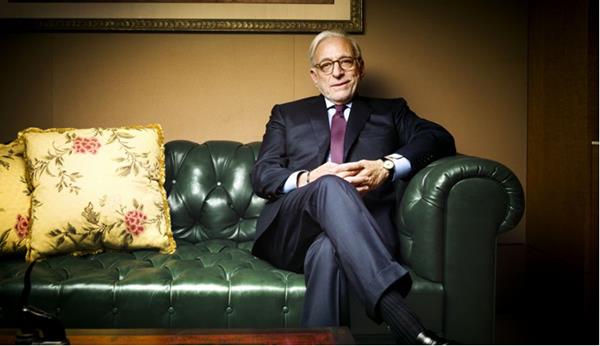
Fortune Insider
Activist
Investors
Nelson Peltz and
activist investors are not as evil as you think
|

Nelson Peltz in his office in New
York
Photo: Ben Hoffman
|
Activist investors are actually doing
something good for the companies they target, the economy as a whole,
and quite probably your portfolio.
Itís one of the most fundamental questions in business:
Do you issue dividends or re-invest in capital improvements and R&D to
strengthen a company for the long-term?
Much has been said recently about the evils of ďshort-termism.Ē
Itís the M.O. of activist investors who take sizeable stakes in
companies, then agitate for changes they think will boost share
prices. Take for instance Nelson Peltzís Trian Fund Managementís
unsuccessful proxy fight over board seats at Dupont (DD).
Short-termism, critics say, diverts funds from investments that can
produce sustained growth ó such as workforce training and new product
development Ė but have little immediate payoff. The short-term
investors, meanwhile, benefit from a spike in stock prices, and take
their money and run.
Or so the common wisdom goes.
Granted, investors have been turning over shares much
faster over the past two decades. About 20 years ago, the average
share in a public company changed hands about once a year; now itís
once every four months. But short-termism isnít the scourge itís
cracked up to be. Hereís why:
Short-term trading doesnít equal short-term decisions
by managers.
Itís logical that company executives, eager to appease
shareholders, might make short-sighted decisions. Think about it:
shareholders receive a return in one of two ways. One is a current
dividend; the other is the price at which they exit. Assuming an
efficient market, stock price is the properly discounted value of
future cash flows. If a company damages its long-term prospects, the
exit price is low. Thatís something no one wants, especially
short-term investors.
Activists play a vital role in markets
Markets are not necessarily efficient for all stocks
all the time. Market inefficiency implies mispricing, which is why
active investors exist. Based on the horizon of mispricing, active
managers specialize. Some, such as Warren Buffet, specialize in
long-term mispricing. Others specialize in the shortest-horizon
mispricing, e.g., high-frequency traders. Activist investors exist in
the middle of this spectrum, two to three years on average. They
target firms whose current prices are not necessarily mispriced but
are undervalued relative to its potential. Once the undervaluation is
corrected, the activists move on.
Dividends remain in the ecosystem
People tend to associate certain policies, notably
paying back cash to shareholders, with short-termism. They assume that
the funds used for payback disappear from the ecosystem. If cash
reserves are parked in T-bills, itís more productive to put the money
back into the hands of shareholders who can then choose to invest in
firms and ventures they deem promising. In the end, payouts do not
necessarily reduce investments, but allocate the choice of investment
from managers to investors.
R&D is a form of investment that should be subject to
economic reasoning.
The most compelling defense of activist investors is
that they donít impede innovation. In fact, they help reshape it.
Activist investors donít slash budgets
indiscriminately. They treat R&D as a form of investment where an
investment with a positive net-present value will be a profitable one.
Research I conducted along with Alon
Brav and Song Ma of Duke University, and Xuan Tian of Indiana
University, shows when activists targeted firms with diverse business
portfolios, they examined whether outlays for R&D were directed toward
the firmís core competency. If not, those funds were likely to be cut.
The activistsí intentions werenít malevolent; they simply wanted to
ensure that companies were highly focused.
Short-termism doesnít artificially inflate stock price
There is no evidence that investors systematically
undervalue firms whose projects are long-term where cash flow is
highly uncertain and will take significant time to materialize. In
fact, multiple market-wide bubbles were formed by investorsí
unrealistically optimistic valuation of such firms.
Itís hard to argue that short-term investors are bad
for business. So give them a break. Theyíre actually doing something
good for the companies they target, the economy as a whole, and quite
probably your portfolio.
Wei Jiang is the Arthur F. Burns Professor of Free and
Competitive Enterprise at Columbia Business School. Jiang is also
director of the schoolís Jerome A. Chazen Institute of International
Business. |

